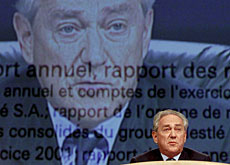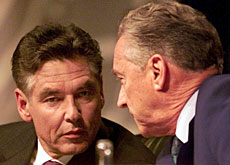End of an era as Nestlé chairman bows out

The retirement of Rainer Gut from the chairmanship of food multinational Nestlé marks the end of an era in Swiss economic life.
The formidable banker was regarded as heading the generation of managers who have controlled the levers of economic power over the past 30 years.
In April, 72-year-old Gut will be stepping down from his last major post. For age reasons, he is obliged to give up his seat on the company board.
Exit Switzerland’s most influential banker, incidentally the only one to have earned himself a solid reputation on Wall Street.
It is also farewell to the most powerful of the technocrats who have directed Switzerland’s fortunes over the past three decades, exploiting a far-from-transparent network of financial and political connections.
Having gained experience early on in the United States, in 1973 Gut joined Credit Suisse (CS), now the Credit Suisse Group (CSG), in Zurich.
He was soon entrusted with the task of restoring the celebrated bank’s fortunes and good name, after it had been rocked by a scandal at its branch in Chiasso, the worst case of corruption in the Swiss banking industry’s post-war history.
He ensured that Credit Suisse’s image was revamped, and the organisation rose to a leading position in the world of international banking.
Top of the table
“Gut was one of the managers who did most to elevate Swiss banks and other companies to top positions in the world economy,” claims Erik Nolmans, a journalist with the financial monthly Bilanz and co-author of a book devoted entirely to the great banker.
For several decades, the Swiss banking industry powered ahead and managed to attract 30 per cent of the offshore assets deposited worldwide (SFr3,300 billion).
The banks assumed an increasingly pivotal role in the national economy, accumulating wealth and absorbing job losses in the industrial sector.
After strengthening their positions through mergers and takeovers, in the 1990s the giants of the Swiss banking world, Credit Suisse and UBS, were faced with the complex issue of Holocaust-era assets, which had lain untouched in dormant Swiss bank accounts.
While other political and financial chiefs underestimated the extent of the threat posed by attitudes in the US, and made some unfortunate miscalculations, Gut began manoeuvring behind the scenes.
“With his understanding of American attitudes and business practice, he was the chief architect of the global agreement reached in 1998,” Nolmans observes.
An agreement which cost the Swiss banks a cool $1.25 billion, but prevented their exclusion from the all-important American market.
High-risk strategies
Then, towards the end of the 1990s, financial speculation gathered pace, share prices rocketed and, in a matter of days, the dot-com bubble created new millionaires.
The doyens of Switzerland’s major banks and insurance companies abandoned their traditional prudence and embarked on high-risk strategies and takeovers.
Paying over the odds, Credit Suisse acquired the Winterthur insurance company (for SFr15 billion) and a number of investment companies, such as Donaldson Lufkin & Jenrette (for SFr20 billion).
In 2000, when he was forced to hand over the reins of power at CS on the grounds of age, Rainer Gut bequeathed a host of problems to Lukas Mühlemann, his chosen successor.
In 2002 and 2003, Switzerland’s major banks and insurance companies – including CS – presented their worst ever financial statements, due partly to the crisis triggered by the events of September 11, but also to the financial black holes they had dug for themselves in the 1990s.
Heads rolled, including those of Mühlemann and the old guard at insurers Zurich, Rentenanstalt (Swiss Life) and Winterthur.
No criticism was spared of the arrogance of the Zurich-based managers, their financial wheeler-dealing, and their political connections, particularly with members of the centre-right Radical Party.
In many cases, seats on the boards of these companies had been handed out not on the basis of professional competence, but as a result of string-pulling and the lobbying power of the new members.
The string-puller-in-chief was in many cases Rainer Gut, jokingly known as the “head of Swiss human resources”.
Swissair grounding
This phenomenon was strikingly exposed in 2001, with the dramatic grounding of Swissair, an event which shook Switzerland to the core.
At that time, the company was headed by an elite of Radical Party cronies, hand-picked by Gut, who had been on the board of Swissair until 1995.
Once again, it was the grand puppet-master of the Swiss economy who gathered together financial chiefs and the two Radical Party ministers, Kaspar Villiger and Pascal Couchepin, to find the SFr4 billion needed to finance the new national carrier, Swiss.
The champions of economic liberalism had no compunction in involving the state in an attempt to save face.
But the crisis which engulfed Swissair and the giants of the Swiss banking and insurance sector have left their scars on Zurich and the Radical Party.
Zurich has sacrificed some of its financial clout and reputation as a financial centre, losing out to Basel, while the Radicals, traditionally the party of sound economic management, have lost ground to the Swiss People’s Party.
“The credibility of managers depends on their ability to deliver,” explains Erik Nolmans.
“The weakness of the financial grandees associated with the Radicals has undoubtedly provided the Swiss People’s Party with plenty of ammunition in recent years.”
swissinfo, Armando Mombelli
Rainer E. Gut was born in 1932 and grew up in Zug.
In 1973, after five years in banking in the US, he joined Credit Suisse in Zurich.
From 1983 to 2000, he was chairman of the board of Credit Suisse.
From 1974 to 1995, he was also on the board of Swissair.
Since 2000, he has been chairman of the board of Nestlé.
After occupying the most prestigious positions in some of Switzerland’s principal companies, Rainer Gut is quitting his last major post.
In April, he will step down from the chairmanship of the multinational Nestlé.
Erik Nolmans and René Lüchinger have written a book about him: Rainer E. Gut: Bankier der Macht,(Rainer E. Gut: Power Banker) Bilanz-Verlag.

In compliance with the JTI standards
More: SWI swissinfo.ch certified by the Journalism Trust Initiative










You can find an overview of ongoing debates with our journalists here . Please join us!
If you want to start a conversation about a topic raised in this article or want to report factual errors, email us at english@swissinfo.ch.